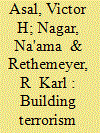| Srl | Item |
| 1 |
ID:
141472


|
|
|
|
|
| Summary/Abstract |
In April 1984, 25 members of the Jewish Underground were arrested by the Israeli General Security Service moments after they had planted explosives in five Palestinian-owned buses. Their arrest and sentencing brought to an end one of the more sophisticated expressions of Jewish terrorism since the birth of Israel. Overall, the group planned four operations, one of which was the conspiracy to bomb the Muslim holy sites on the Temple Mount. As we outline below, social links between the members of the Jewish Underground significantly facilitated the creation of this organization. We demonstrate that social capital, here expressed in terms of networks, trust, and norms – which are widely considered important components of a healthy democracy – can take a negative turn toward participation in terrorism.
|
|
|
|
|
|
|
|
|
|
|
|
|
|
|
|
| 2 |
ID:
110855


|
|
|
|
|
| Publication |
2012.
|
| Summary/Abstract |
Despite plentiful scholarship relating to the prospect of terrorists utilizing chemical, biological, radiological, or nuclear (CBRN) weapons, little of this work is both quantitative in nature and global in scope. Leveraging open-source data, this study quantitatively explores factors influencing the terrorist organizational decision to pursue CBRN weapons. The findings suggest that organizations embedded in alliance structures and based in authoritarian countries with relatively strong connections to a globalized world are more likely to seek to develop or acquire CBRN weapons. Contrary to previous qualitative studies, the present study failed to find a significant relationship between CBRN pursuit and religious ideology.
|
|
|
|
|
|
|
|
|
|
|
|
|
|
|
|